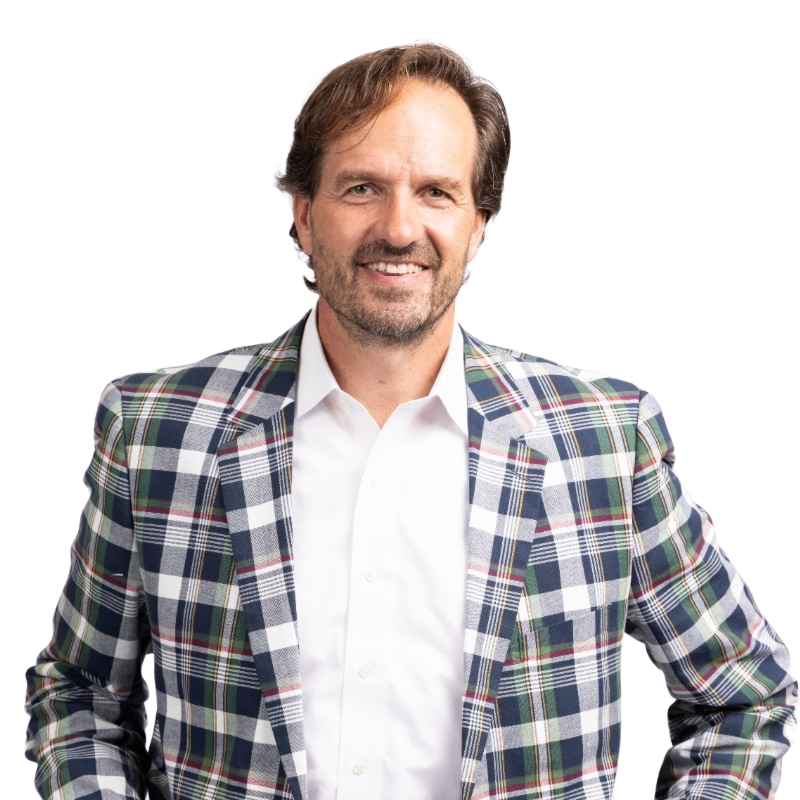
BACK TO PODCASTS
Soumya Srinagesh
CRO
|
Deliverr
Episode #
3
Tracy Young, co-founder and CEO of TigerEye, interviews Soumya Srinagesh, CRO at Deliverr, on how to build customer-first strategies to foster trust and drive revenue growth.

Podcast Transcript
Tracy Young: Hi, welcome to Tiger Eye's LinkedIn live show. I'm Tracy Young, co-founder and CEO of TigerEye. Today we are joined by Soumya Srinagesh, CRO at Deliverr, to talk about how to build Customer first strategies to build trust and deliver revenue growth soon. Soumya, welcome.
Soumya Srinagesh: Thank you so much for having me here, Tracy.
Tracy Young: Oh, it's always so much fun to talk to you and see your smile. So start just tell us about yourself and your life and your career.
Soumya Srinagesh: Well, I'm Soumya. A little bit about me personally, first. I grew up in the Bay Area. My parents are Indian. So I'm first generation American and grew up in the classic tiger mom type of household. Which has led me to kind of where I am today. I'm a CRO of Deliverr. Professionally, I've spent the last decade in customer engagement technology. I've worked at companies like PayPal, Twilio, and now Deliverr acquired by Shopify. helping high growth technology and e commerce companies reinvent their customer experiences.
And along the way, I've really formed a point of view on how you develop a really customer centric B2B company that's so good at customer engagement that they can help leading brands, whether it's PayPal or United Airlines.
Personally, now I live in Truckee, California with my husband, Justin, I have a, a one and a half year old and, and a puppy.
Tracy Young: Oh, that's really, really sweet. And it's beautiful up there. So I'm happy for you. I've listened to several interviews and read several of them, and I know that you really care about customers. You just talk about it, you know, being, of course it's who we serve. So what does being customer first actually mean?
Soumya Srinagesh: I think really for me means building your business so that everything about your success, it's like a requirement for customers. To be successful for you to be successful.
I think a lot of times when we think about how businesses engage with their customers, we almost think like they're on opposite sides. Like if one person is winning, the other person is losing, you know, as an example, we're building a garage right now. And my assumption is like most of the people who are engaging with us, it's like, they're throwing like these quotes at us and I'm like, Oh, like, you know, you're probably trying to take more money from me.
And, and it's always this head to head thing. And for me, customer first. Businesses are ones where like you're only successful when your customers are really successful and ultimately the way you build your sales motion, the way you build your pricing strategy, the way you build your products, it's all about having an incredible experience, driving more and more adoption and usage and people win together when the product is really working.
Tracy Young: Let's double click on there. So having a customer first culture means that everyone has to be on board. You know, new people coming in, they might come from a completely different customer culture. And it has to be ingrained in every person in every department. Everyone's always knee deep in their own problems thinking about their own projects and initiatives. So how do you help nurture that customer first culture?
Soumya Srinagesh: Such a good question. You know, for me I've been lucky in that, you know, everywhere I work, people will say like, I'm customer first. I think they genuinely mean it. I haven't had the experience of working. People are like, Oh, like You know, screw the customer and like, let's think about us.
And that's been really great. But what I have really encountered is we have very different definitions of. What customer first means. And sometimes we have just different interpretations or assessments of what we think the customer needs really are. And I feel that my role, especially as CRO is to be the voice of the customer.
As someone who's representing the team that's on the front lines with the customer all day, every day, and synthesizing and making crystal clear, what does customer first mean at our culture in our company and in our culture so that everyone is independently able to make decisions. That are aligned in the same way.
So I'll give you an example where like, I think at times it can really break everywhere. I've worked has been a very product led growth business model. So a lot of times for us, the customer is like. The developer in the garage building their first app or the mom who has a side e commerce business who's starting her first online store.
And we think a lot about like, okay, like, how do we make a really simple product like that? Someone like that could adopt to build their first customer engagement or e commerce application. And then we think a lot about how to make things super simple. centric.
But I think at the same time, like the mom that's in her garage, who's going to grow into the next figs or all birds or your, your, you name it, doesn't just want a really simple product that doesn't do anything like an iPhone is simple to use. It isn't simple to build, doesn't not do a lot of stuff. It does a lot of stuff.
It's just simple to use. And so like helping kind of think about how do you build enterprise grade functionality that. An entrepreneur or startup can use and then really grow with until they're ready to be a public company or be a billion dollar business is an example where like I think a lot of businesses, everyone might say they're customer centric, but some people are thinking of the customer as a giant enterprise.
Some people are thinking of the customer as a tiny startup, and then we're all doing something very different because we're not totally aligned on who the customer is. And so for me, a lot about the customer centric culture is like, well, customer can mean a lot of things. Who exactly is our customer?
What do they need? How do we quantify that? And then how do we use that to drive through all of our decision making and then ultimately hire and build and. bring together a group of people who are inspired by and excited for the specific customer that you're trying to serve.
Tracy Young: So today's customers have high expectations for personalized experiences. I'm sure your LinkedIn is just full of spam. I mean, you know, and that's the, the trade off. We're pushing marketing to generate more leads for us get more hand raises and. My question is not do you, do you spam your customers? The question is how do you balance the customer needs and their preferences with, you know, the business needs of scaling your business?
Soumya Srinagesh: Yeah. Such a great question. So for me, I think, you know, first part of the question was about like personalizing customer experiences. And. I think when I talk to a lot of companies that I advise or companies who are building, like there's, they'll say something like, I want to be the whatever, X solution that everyone uses for whatever I do.
And like, I think. That actually is a really, really hard path to be on. I think that, like, having a really crystal clear understanding of the type of consumer or type of customer you can add the most value to and building your customer engagement experience around that is a better starting point. So, as an example, like, Tracy, you're building a solution.
For amazing sales forecasting and sales operations. And you're not like, Oh, you know, it could also do marketing. It's like, you know, and it could also do customer success. If you do this or that you're like, no, like I'm talking to the Rev Ops leaders all the time and I'm know their problem, problem really deeply, and I'm going to win with that market and that audience.
And so for me, like the first part of. Personalizing experience starts with like personalizing at the industry level. You know, what are all financial services companies doing? What are all apparel and accessory companies doing with your technology in your space? And building a really clear community and story around that.
Like if I'm doing awesome with PayPal and Intuit, I should go then talk to, you know, Bank of America. I should not necessarily go turn around and take that story and go tell William Sonoma what PayPal's doing. They're completely different businesses. From there, it's like, okay, now if you've personalized an industry level, what are you personalizing at a business level?
Like really go read customers, 10 Ks and public reports. That's like obvious stuff. But you know, if you're especially in a product led growth business model, if you're able to go a little bit deeper, what is the data that shows you like how this customer is going to get value from your platform? And then like the last level of personalization for me is like, I think a lot about the humans I'm engaging with.
Like actually companies don't buy technology. Humans do, you know? If I'm on the phone with a director of supply chain for an e commerce brand, like, what is her personality style? Does she like to be just the facts? Does she want to talk about her kids? Does she want to be connected to me personally?
Does she want to have things in the writing? You know, what is her professional motivation? Is she new and needs a win this year? Is she trying to save costs? Is she stuck in like, you know, organizational weirdness because there's other teams with other goals? Like... To me, like that personal level of like selling to a human and knowing that they are buying your technology is actually like probably the most important part of all of this personalization stuff.
And ultimately like kind of stepping back when you build your audience, targeting your marketing, your business, your collateral, everything around those three levels of personalization, industry, business, individual, I think is when you get that fully customized experience that buyers are looking for.
Tracy Young: Really love the lens at which you see your customers and how to how to speak to them. It's so practical. And there's just lots of good nuggets there. So I'm excited for our listeners to hear that. Let's talk trust. Trust is obviously everything. Trust is crucial for all relationships, including long term customer relationships, So what's your approach to building trust with customers? Like, when do you know you have it?
Soumya Srinagesh: Yeah, such a good question. When do you know you have it? So for me, my approach of building trust, it's two things. One is delivering value and two is being accountable. When it comes to delivering value, I think a lot about myself as. A teacher. And it's hard to be a teacher to my customers because a lot of them like I'm talking to someone who's been maybe doing supply chain for 20 years and probably knows more about, you know, logistics for apparel or something like that than I might know about logistics and e commerce.
But I thought a lot about like, well, you know what we're doing here at Deliverr is like Entirely reinventing logistics, and I thought about it differently, and we might be really aligned on problems. But how can I teach them a new way of considering the world ahead of them and a different way of looking at the problems they're trying to solve in a way that really makes them think?
And it's actually funny because When our sales management team was looking at some of our customer data, we found actually one of our biggest like losses in the pipeline. It's just a customer would ghost us after one call and it's like, we just get all these people are like, I totally want to talk to you and then I'll never talk to you again.
And what we kind of found out is basically customers would call us and we'd be like, well, how do you do this? How do you do that? Oh, we can do this. We can do that. Here's our pricing. It's so easy. And then they'd never call us. And I think it's because basically, even though we were in our minds really trying to be like, yeah, we can do all these things you want.
We weren't teaching them something. We weren't really adding value or just like we're kind of the same. We're doing these things you want and here's our price sheet. And that's where I had this insight that actually there's a couple really disruptive ideas that are counterintuitive that are honestly controversial and might be uncomfortable for our audience to hear, but those are the things that we need to teach them to kind of get more attention.
And add more value. So for me, that teaching piece is a huge part of it. And then accountability is the other piece. You know, when I introduce myself to customers, I say like, hi, I'm the CRO. I am responsible for your end to end customer experience. And the buck stops with me. And it's not just like the company is accountable for them, but it's like, I'm personally going to be accountable for your success on a platform.
And I think it means a lot to people to hear that the team that they're working with, like, takes their customer success incredibly seriously and as, as personally invested in getting their business growing and live the same way that they are.
Tracy Young: Thank you for that. How do you think about short term needs versus long term vision?
Because oftentimes revenue growth now, you know, closing the deal now might be completely disconnected from where you're trying to go as a business. Yeah. How do you find that balance?
Soumya Srinagesh: Ah, yeah. You know, it's funny because I've been there and I've been the person, probably on the wrong side of this, where it's like the shiny deal comes up and I'm like, what if we change our whole company to win this deal?
And everyone's like, are you insane? And the rule of thumb. Is like, you've got to be able to hit your annual revenue numbers where customers get value today from what is in the product today, like 70 percent of what they need is functional and available. And when they launch, they're going to be happy.
And 30 percent of things they want are coming and you know, they're coming. And honestly, like, if you don't think you can get enough customers in the door where that's. the case, then like something probably is not right with how you're thinking about your revenue goals or your product strategy or one or both.
But you need to be able to pick a market that's big enough where like if you're closing 20 percent of the deals in your pipeline, you can hit your numbers. And you know that like roughly those customers are going to be able to succeed on the platform you have and that like the defined roadmap that you have is going to be adding value to those customers.
And. I've like kind of been on the wrong side of that. We're like, you know, we've picked, like, I, I've had a deal that we closed and my product and ops teams were like, you know what, if, if every one of these hundred things go right, like this might work. And we like tried it anyway. And of course, a bunch of those things went wrong.
That's life. Right. And the customer and us had to part ways and that's just never the situation that you want to be in. And then that snowballs into losing trust with new customers and other customers, because this is a small world and customers and. And competitors will find out about these things.
So for me, the rule of thumb is like, customers need to be able to launch successfully with what you have and then things that are coming, like everyone needs to be very on the same page and documented around what that is. And like, it's just part of how you earn trust. Like if a customer comes to you and they're like, I need GDPR by next year, and you know, your R and D team hasn't even started thinking about it.
Like you just have to say no. You know and that's just really hard to do, but I think that's the right way to earn trust and to be customer centric.
Tracy Young: I totally agree with that. Switching subjects a bit. I want you to talk about leadership. I think that you just have such a different perspective than so many people I get to talk to. Like, what is your leadership style and what do you look for in sales leadership? Like your direct report?
Soumya Srinagesh: Yeah, a great question. Well, I'm curious to hear what you think is different about my style, but you know, I think one thing that's... Maybe refreshing or different about me is like, I haven't been a super senior leader for that long.
It wasn't that long ago that I was an account executive or I was doing slides or Excel sheets or whatever it is. And actually like understand what it is to be in every level of job in my organization. And I have a lot of empathy for the people who are doing those jobs. I have a lot of respect for the people who are doing those jobs.
Those jobs are really the hardest jobs if you ask me. And, A huge part of how I hold myself accountable is, is really thinking about how am I making everyone else's life a lot easier that's in my organization. And the way I do that is like a few things. One is like, I am doing little parts of everyone's job so that my head, feet stay planted on the earth, and I actually know what's going on in our business.
You know, if I'm going to a conference, like, I'm going to sit and cold call and email attendees that I want to meet with. I'm not just like, marketing, do it, you know. If, I am talking to customers, like I'm going to do the prep. I'll open up my screen and share screen and do a demo. Like I will do all of those things.
And I think a big part of my leadership is showing my team that I'm also in the trenches with them and that I'm here to help and that I can do these jobs and I understand what's going on, I think that's earned a lot of credibility and respect from my organization and honestly, even from my customers who kind of.
I'm really engaged and I'm doing things that are adding value to them every day. One of the things that I think has just added a ton of value to me is I do a roundtable. Every week it's like 45 minutes and I rotate through my entire organization in groups of eight to 10 and I never have a format, it's just three questions.
Or I never have a really detailed agenda. It's just three questions. What's working. What's not working? And what advice do you have for me? And it's actually incredible. Almost every week, someone will say like, Oh, I've never really had a leader do this before, which is kind of interesting. Cause it's like the highest impact 45 minutes I get.
Cause I'm getting a ton of honest feedback about the customer experience, about the employee experience in one go and, and earning a lot of trust just by, you know, listening. And so if I had to like, kind of sum up, like what I think makes me a little different as a leader is just like. I'm putting my money where my mouth is in terms of being very connected to my customer and employee experience in a way that I don't think your average leader takes time to do because, you know, calendar gets filled up with board meetings and executive meetings and blah, blah, blah, you know, so much crap.
And no one's really measuring you on like, did you talk to all of your employees? But like, that's something that I just see as like, so critical to how I lead.
Tracy Young: So I'm going to answer your question for me earlier, which is like, what is my perspective? I mean, we, we haven't really interacted, but the conversations that we have had, it's like deeply ingrained in me.
I really love the conversations that we've had. My read is. You're highly intense, just even like listening to this interview and talking to you now. The crispness and the depth at which you can go. And then also, strangely enough, you just seem really fun and down to earth and like a normal human being.
I'm not afraid to be so. So that's my read. I think I'm like pretty good. Judging people and have good taste in people, which is why you're on this interview. And your thoughts there in response.
Soumya Srinagesh: No, I, I think that that's what I'm hoping to be, you know, I've spent honestly like a lot of, of life trying to be someone I'm not, to fit in, and to feel accepted, and to like, like honestly feeling really out of place in a lot of places that I'm in, and I think a lot of people can relate to that a lot of people can probably Relate to like moments of just being excluded in their life and like hating it and like not feeling sure of who they are.
And I think over the last year, I think COVID in some ways was like an accelerant of that is just like, this is who I am and I'm not going to try to act more serious than I am or pretend to be like other people that I see. I'm just going to show up as, as a normal human. And. It's been amazing. Like, I feel like just for me building really, really deep connections with people, which is kind of just based on showing up and being authentic as a human and bringing your energy that then like rubs off on everyone else has unlocked so much success.
If we were doing this interview like five years ago and you're like, what's your secret to leadership, I would probably have been like. I look at data all the time and work harder than everyone else. But like, that was a time in my career where I was getting like 0 percent employee engagement scores and like not, you know, leading multi hundred person teams or multi billion dollar businesses, you know?
And like the crazy thing for me is once I really actually took some of that nuts and bolts of like, that's the stuff I do all day, right? Like I'm looking at spreadsheets and I'm in meetings and I'm writing docs. But, like, unlocking this deeper level of, like, how I engage people around me and how I show up and how I actually just, by doing that, create the space for other people to do their best work has been where it really accelerated the type of results I've been able to get.
Tracy Young: Yeah. It makes me so happy to hear that. In the confidence in being exactly who you are, because even with all your flaws and weaknesses, which I'm sure you have, you're the most perfect version of Subia that can possibly be.
Soumya Srinagesh: Oh, thank you. Thank you.
Tracy Young: So a lot of our, our listeners are early on in their careers, and I'm so happy to get to have you as an example. What advice would you give yourself 10 years ago?
Soumya Srinagesh: Great question. What advice would I give myself 10 years ago? So... I think things that I did well that other people should do is like, I am just, I work very hard and I'm very committed. I think it was true then and it's true now that there's just like no amount of personal transformation, work, like, effort that I'm not willing to put in to accomplish my goal.
And I think, I think if you're hungry, like, lean into that, because everyone can pick up on your energy and your work. And if you're in this industry of like, tech, like, hard work really is like, 80 percent of it. Okay. Like we're not, you know, my mom's a doctor, my brother's a doctor. We're not doing brain surgery.
Like you don't need that technical knowledge necessarily. Like you really need to put in the effort and learn really quickly from your mistakes and keep learning as you go and asking great questions. And I think that hunger and that enthusiasm, like when people see it, they're gonna want to like water that plant.
And so showing up with that is number one, like, don't be like too cool for work or like. Not asking questions. We're not taking advantage of like the experience that you're having. You know I played golf the other day on, on the course with this kid who had just graduated from University of Oregon.
He's like looking for his first job and he asked me like a thousand questions and I'm like still thinking about him a couple of days later. He didn't ask me like, Oh, can you send my resume around to chop by? But if he had, I would have a hundred percent done it. Be the eager beaver, like lean into the opportunities, like it might not feel cool, but like that's gonna set you apart.
I think the other thing for me is like people told me all the time and I did not listen and it's totally bitten me in the butt, which is like play chess and not checkers and be patient. There were so many times where like, I just, I would get such a bee in my bonnet about this person's making 3, 000 a year more than me or like their title is senior and my title is not senior and like just a lot of external stuff and I would get really amped up about like how it was measured and how it's paid and what my title is and comparing myself to other people.
I set my vision on things that were really dumb because I was comparing myself to like people around me and I had like a really eye opening moment with a professional coach where she was like, you know, give me your wallet. I was like, okay, this is weird. Gave her my wallet. She was like, here's a billion dollars.
And I was like, okay, now I get it. Like when you're so impatient and focused on what's around you here, you're not really seeing what's. Bigger out there. And that was something a lot of people told me earlier on my career that frankly, I just totally ignored. And now I see a lot more clearly, which is like, your career is a long journey.
There's really big prizes out there. Think coldly, calculatingly, logically about your next steps and what you're going after and like, whether the thing you're fighting for is really serving your bigger purpose. And that's something that I wish I would have done differently. I've wasted hours and hours.
Tracy Young: And I think a good way to just double check, triple check the things that we want now are actually serving to our future is just, it's just trying to unlearn and ask ourselves why, why do I care about this thing so much?
Soumya Srinagesh: 100%. You know, a huge question for me is like, what is the value of X? I ask myself that all the time.
Like, what is the value of writing a mean email to this person? What is the value of, you know, whatever it is that I'm about to do? And it like completely stops me in my tracks because a lot of times the answer is like, there is no value to that, you know, and you know it and people around you know it. And so I really encourage people to ask them that.
And, I agree. You know, for me, like, I have a really... Now, like clear vision of what I want to accomplish next, which is I want to be the CEO of a highly impactful company. And I tell myself that like once a day, people ask me that. And like, honestly, a lot of people like laugh when I say it, because I think maybe they think it's ridiculous, but like, that's really my goal.
And like, I think about it a lot. Like how is. Whatever I'm considering doing, helping me become the CEO of a highly impactful company. You know, a lot of times it's not so it helps.
Tracy Young: I think you're making great CEO today. Like someone, a company is going to be really lucky to have you there. And what I love hearing is like over time and maybe just part of making mistakes and all your experience and maturing is you have a really clear, you have clarity on.
just the values that you care about. And so let's, let's end it on culture. Culture is obviously, obviously everything. And you've worked at so many places with so many different cultures, but what are the most important ones for you today?
Soumya Srinagesh: Yeah, great question. So number one is like, I play to win. And we're talking a lot about like empathy and like feelings and like all those good things, but like, don't.
Make a mistake about it. Like I'm playing to win and to kick ass and to like build billion dollar, multi billion dollar businesses. And I think that shows up in the intensity and the energy, and that's what I'm looking for in the culture that I'm setting and I'm kind of setting that pace and creating that hunger.
And so it can boil down to really tactical things. Like we have a leaderboard celebratory culture. There's metrics for every team and we celebrate people who want to put points on the board. But it's also in the way we are thinking about. Showing up in the industry, the like intensity that everyone is bringing to the table.
So for me, that's an important part of the culture. Like I'm not just here saying like, Oh, I'd love to make merchants successful. I'd love to make customers successful. Like, we'll see what happens. It's like, we're here to build a really, really valuable company. And I think about that a lot and I, I share that a lot with the team.
And like, I asked people to invite people to. tell me how they want to contribute to that. And to make it really infectious. So playing to win for me is huge. The next thing for me, like culturally that I'm looking for in the team that I'm kind of just trying to lead by example is like, we have to be doers.
You know, at the end of the day, like all I care about is getting stuff done and getting stuff done is not like writing the perfect doc or like having the best project management system. It like all comes down to the results. And so for me, like what's very Objective in terms of measuring results is every team in my organization has a key kind of like P zero metric that they're working towards.
In our sales development organization, it's all about SQLs in our new business sales organization is all about first year revenue. In our existing customer success organization, it's, you know, all about usage data and volumes and I'm all about just using a very objective metric like that to measure success across the team and to hold everyone accountable to a really clear bar.
And there's just no ambiguity about what we're all trying to accomplish and whether we're accomplishing it because like, there's very clear goals. And so I think that clarity actually provides a lot of intellectual safety and emotional safety for teams because they know what's important, like, they're not worried, for example, that I'm going to get upset that, like, You know, maybe a merchant tweeted about us that has one order a day.
Okay, like I care about those merchants like but i'm not gonna like I don't have my hair on fire or something about that because at the end of the day, like we have thousands of merchants and a big business and a revenue business. I'm going to look at metrics across our entire business and not freak out about one example.
And so I think that that kind of clarity is really important to me culturally as leader. That's how like the team is able to talk. And then instead of people being like, well, what does SOMIA think? What would SOMIA do? It's more like, well, what generates the most revenue? What reduces trend the most, and everyone is using like the same business drivers to make their decision with the way that's really clear.
And then I think the last thing for me is, is what you talked about, which is like, I think you phrased it as fun and down to earth. But for me, it's like just creating an environment where people can be themselves. And do their best work. That means we're being inclusive. That means we're treating everyone with respect.
And that means, you know, like people feel like they can show up and contribute great ideas, fail and learn. All of those things that, you know, help us grow and transform our business every year.
Tracy Young: I loved hearing all that. It is so obvious to me you are a very unique and just good leader. So I'm excited to read more of your interviews. Thank you so much for participating and talking to us today. And. That's all I have for you. There's just so many good nuggets in here. I can't wait to go and listen to it again.
Soumya Srinagesh: Amazing. Thank you so much, Tracy. It's always such a pleasure to talk to you.
Tracy Young: You're awesome. Bye Soumya.

.png)













